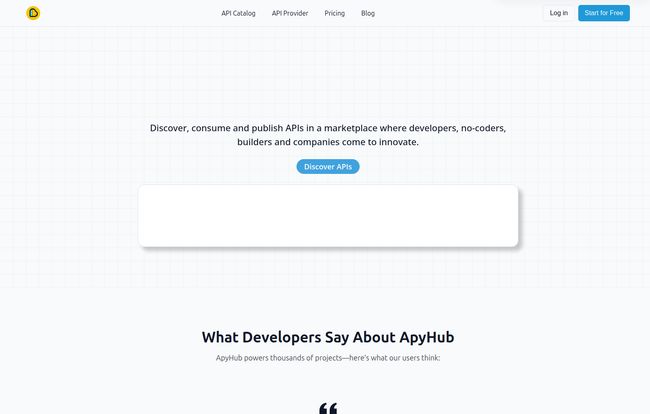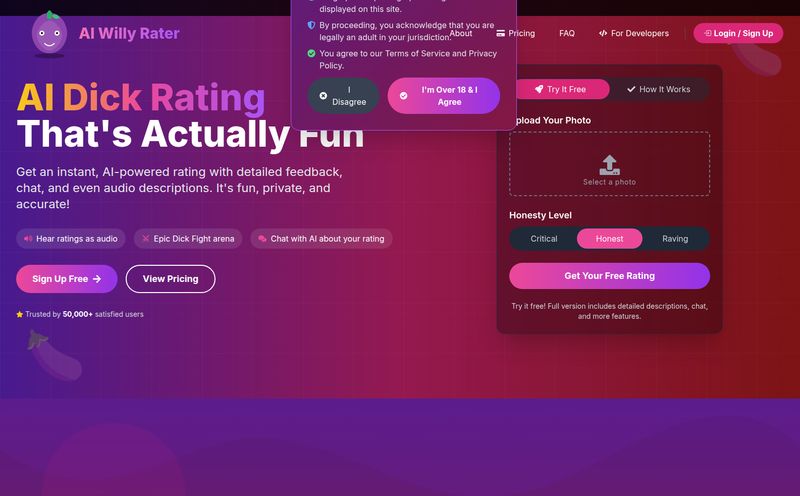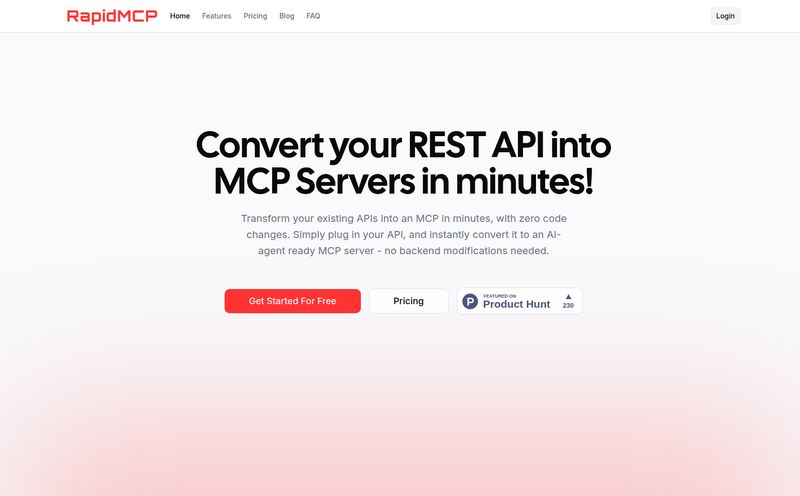As developers, builders, or even just ambitious marketers, we’ve all been there. You have a brilliant idea for an app or a new feature. You're fired up, the coffee is brewing, and then you hit it. The wall. The realization that 60% of your brilliant idea involves building tedious, foundational stuff from scratch. Things like converting a user's uploaded DOCX to a PDF, checking if an email is valid, or—the big one—integrating some kind of AI to summarize text.
For years, the solution was to either spend weeks wrestling with open-source libraries or to juggle a dozen different API subscriptions, each with its own key, billing cycle, and weird documentation. It’s a drag. It’s the kind of busy work that kills momentum and turns exciting projects into a slog.
So when I first heard about ApyHub, a platform that bundles over 150 ready-to-use APIs under one roof, I was intrigued but skeptical. Another all-in-one solution? We've seen those before. But the more I looked, the more I felt that this might actually be different. This might be the API supermarket I've always wanted.
So, What Exactly is ApyHub? Beyond the Buzzwords
At its core, ApyHub is a massive collection of APIs that you can plug directly into your applications. But calling it just a "collection" is a bit of an understatement. It's more like a managed toolkit, a digital Swiss Army knife for developers and no-coders alike. They handle the hosting, maintenance, and scaling, so you can focus on what matters: building your product.
Their big promise?
Build in minutes, not months.
It's a bold claim. But when you look at the sheer variety of tools they offer, you start to see how it's possible. You're not just getting a single tool; you're getting an entire workshop. Need to generate meta descriptions for a thousand product pages? There’s an API for that. Need to remove the background from an image? There’s an API for that, too. Its a platform designed to remove friction.

Visit ApyHub
A Peek Inside the Toolbox: The ApyHub API Catalog
Okay, let's get into the good stuff. The actual tools. ApyHub organizes its APIs into logical categories, which is great because nobody wants to scroll through a list of 150+ endpoints. I won't list them all, but here are the ones that really caught my eye.
The AI and Smart Generation Tools
This is where things get exciting. ApyHub is leaning heavily into AI, and it shows. You have access to things like AI-powered text summarization, sentiment analysis, and even product introduction generators. Imagine you're building an e-commerce site. Instead of writing copy for every single item, you could use their API to generate compelling descriptions and even categorize products automatically. They even have tools to generate personalized thank you emails. That's a small touch that can make a huge difference in customer experience.
The Data and SEO Powerhouses
As an SEO guy, this section made me sit up a little straighter. ApyHub offers tools for generating SEO keyword ideas, checking a domain's authority, and even analyzing backlinks. While they might not replace dedicated tools like Ahrefs or Semrush for deep analysis, they are incredibly powerful for integrating SEO-aware features directly into a custom CMS or a client dashboard. Plus, the data validation tools—for checking emails, phone numbers, and even VAT IDs—are pure gold. They're the unsung heroes that prevent bad data from ever entering your system.
The 'Unsexy but Essential' Utility APIs
This is my favorite category, honestly. It’s filled with the tools that solve the most annoying, time-consuming problems. We're talking about file conversion (URL to PDF, HTML to PDF, image converters), file manipulation (merging PDFs, compressing images), and file security (watermarking, encrypting). These are the tasks that can derail a project for days while you hunt for the right library and figure out its dependencies. With ApyHub, it's a single, predictable API call. Done.
"Using ApyHub for explicit content detection—text, image, video. The best that I've tried so far."
- Yeremey Kerzhentsev, Software Engineer and Founder, Eurides
That quote from their site about content moderation is a perfect example. Building a reliable content filter is a massive undertaking. Here, it’s just another tool in the box.
Let's Talk Turkey: ApyHub Pricing and "Atoms"
Alright, this is the make-or-break moment for any platform. How much does it cost? ApyHub uses a tiered subscription model, and I've got to say, it's pretty generous, especially at the entry level.
But first, we need to talk about "Atoms." This is ApyHub's currency. Think of them like arcade tokens. Every time you use an API, it costs a certain number of atoms. A simple call like validating an email might be cheap, while a complex AI-powered document summary will cost more. This consumption-based model inside the paid plans is what you need to keep an eye on.
Here’s a quick breakdown of their monthly plans:
| Plan | Price (Monthly) | Key Features |
|---|---|---|
| Starter | €0 /month | 5 API calls/day, 2 GB storage. Perfect for testing. |
| Pro | €15 /month | 100K atoms/month, 5 GB storage. Great for hobby projects. |
| Pro + | €40 /month | 500K atoms/month, 10 GB storage. For growing projects. |
| Team | €80 /month | 2M atoms/month, 20 GB storage. For small teams. |
| Scale | €250 /month | 6M atoms/month, 50 GB storage. For larger teams. |
Note: They also offer a 20% discount if you pay yearly, which is a nice incentive.
Big shout out for their Startup Program too, which offers up to 50% off for a year on the team or scale plan. That shows they understand their audience and are willing to invest in new companies. Love to see it.
The Not-So-Shiny Bits (Because Nothing's Perfect)
No review is complete without a bit of constructive criticism. While I'm pretty bullish on ApyHub, there are a couple of things to be aware of.
First, that "Atoms" system. While it's a fair way to price different APIs, it does require you to be mindful of your usage. I’ve been burned by consumption-based pricing before, where a runaway script accidentally racks up a huge bill. My advice? Monitor your usage closely from the get-go, especially as your application scales. This isn't a set-and-forget, all-you-can-eat buffet.
Second, the API limits on the lower-tier plans are just that—limits. Five calls a day on the free plan is purely for dipping your toes in the water, not for running a live application. That’s perfectly fine and expected, but it's something to factor into your development timeline.
My Final Verdict: Is ApyHub Worth Your Time and Money?
So, do I think ApyHub lives up to the hype? Yeah, I really do. It's a fantastic accelerator. It's for the indie hacker trying to launch a product in a weekend. It's for the startup that needs to build a proof-of-concept without hiring three more engineers. It's for the marketing team that wants to add powerful automation to their workflow using tools like Zapier that can connect to APIs.
Is it for a massive enterprise that needs to process a billion API calls a day for one specific function? Maybe not. They might have the resources and the need to build a specialized, in-house solution. But for almost everyone else, ApyHub represents a smarter way to build. It lets you stand on the shoulders of giants so you can focus on building your actual business, not the plumbing underneath it.
Frequently Asked Questions about ApyHub
- What are "atoms" in ApyHub?
- Atoms are the credit system ApyHub uses to measure API consumption. Each API call uses a certain number of atoms based on its complexity. You get a monthly allowance of atoms with the paid plans.
- Is ApyHub good for beginners?
- Absolutely. Because the APIs are pre-built and well-documented, it's a great way for beginners to integrate powerful functionality into their projects without needing to understand the complex backend code.
- Can I use ApyHub for free?
- Yes, they have a free Starter plan that includes 5 API calls per day. It’s ideal for testing out the platform and trying different APIs in a development environment.
- What kind of AI tools does ApyHub offer?
- ApyHub offers a broad range of AI tools, including text summarization, sentiment analysis, product description generation, keyword extraction, language translation, and grammar checking.
- Is there a program for startups?
- Yes! ApyHub has a Startup Program that offers a significant discount (up to 50% for one year) on their Team or Scale plans to help new businesses get off the ground.
- How does ApyHub compare to something like RapidAPI?
- That's a good question. RapidAPI is a massive marketplace where thousands of third-party vendors list their APIs. ApyHub is more of a first-party, curated platform. With ApyHub, you're getting a consistent, managed experience from one provider, with one bill and one set of documentation standards. With RapidAPI, the quality and cost can vary wildly from one API to the next.
Time to Stop Reinventing the Wheel
At the end of the day, a tool like ApyHub is all about one thing: giving you back your time. It’s about letting you focus your creative energy on your unique idea, not on the repetitive tasks that underpin it. If you’re tired of building the same foundational blocks for every new project, you owe it to yourself to check it out. Stop building the plumbing and go build something amazing.



